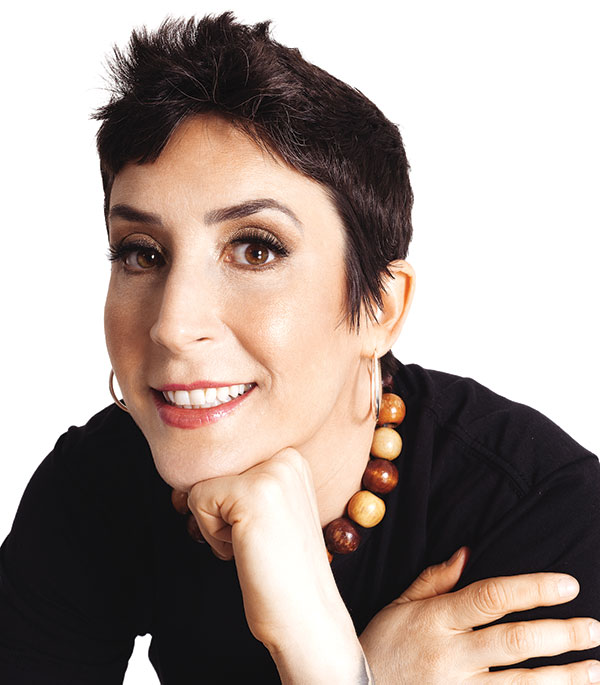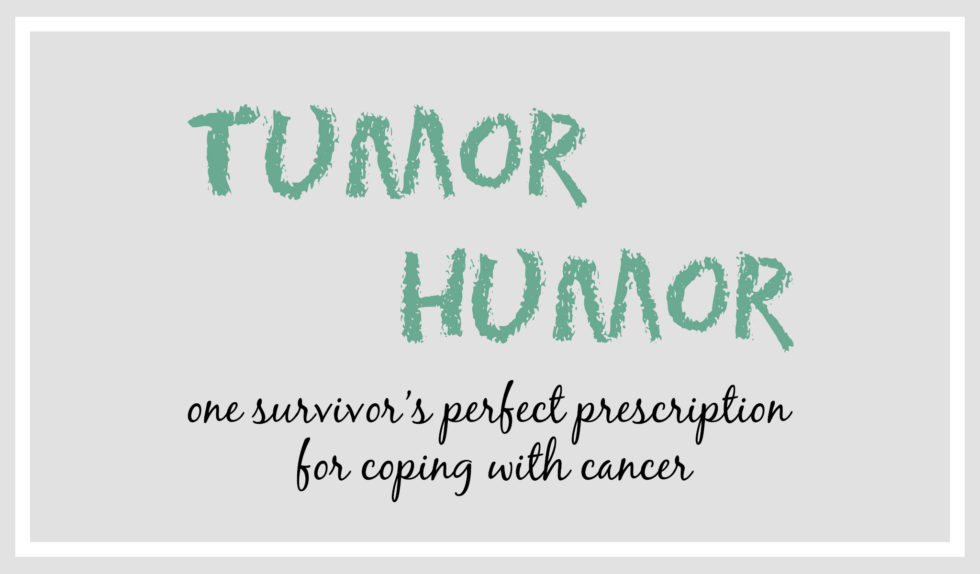Tumor Humor
My Perfect Prescription for Coping with Cancer
by Kimberly Tronic
At age 36, I lived a charming life: I had a great job, great friends, three cats, and an impressive collection of refrigerator magnets.
I started getting on-and-off stomach pains in 2017, but I thought nothing of them until a few months later when I felt queasy and my abdomen suddenly swelled up. I checked into the ER, thinking I had a gallbladder issue, but an overnight hospital stay and a battery of tests led to this verbal bomb: “Good morning. You have cancer.”
It was not a good morning. It was The Big C. Ovarian cancer, stage III. I’d need six cycles of chemo (eighteen treatments) and surgery to remove my ovaries, uterus, and spleen. Ugh. My stress-free life suddenly swerved into scary new territory.
Like a typical 30-something woman of my station, my first instinct was retail therapy. I bought clothes and candles, then meandered into a record shop down the street. As I mindlessly flipped through a bunch of CDs, a comedy album caught my attention.
Hmm. I could probably use some laughs right about now, I thought. Then I dropped $100 on comedy CDs.
The following day, I drove to work, hands trembling and stomach knotted over this terrifying diagnosis. I put on an album – Live – by Tig Notaro, a brilliant comedian who’s endured her share of personal trauma. The next thirty minutes changed my life.
Tig recorded this album just days after being diagnosed with bilateral breast cancer. And she somehow got up on stage and detailed her experience in a way that felt raw, real, grim, and yet hilarious.
“Wait a sec,” I murmured. “If she can laugh at cancer, why can’t I?”
I didn’t realize the significance of that moment until much later, but it truly set the tone for how I handled my own cancer journey.
When I began chemo, I wanted to avoid the emotional turbulence of watching my hair fall out, so I asked my stylist to shave my head preemptively. What could have been the most depressing haircut of my life turned into an impromptu dance party set to girl-power anthems. Instead of crying as my locks flittered lifelessly to the ground, I bravely stepped into a bold new look.
Without my long swishy mane, I had to up my wig game. I already owned a couple of natural-looking pieces, but I wanted to introduce color into the rotation. I bought a bright blue bob, a green layered shag, and a fun, flirty rainbow do.
I liked rocking my wigs during chemo. The sight of IVs and needles and medication seeping into my veins didn’t seem so unnerving when I could look in the mirror and see a neon hairpiece resting on my noggin. During one session, while I relaxed in my bed and patiently waited for the chemo to invade my insides, an older woman hooked up to her own chemo infusion pump walked by and paused when she noticed me. “I love the blue! Is that your real hair?” she chimed.
I giggled, remembering I probably looked like a smurf. “No, this is a wig, but maybe when it grows back, I’ll consider this color.”
“It’s very pretty. I love it. Thanks for making my day.”
I basked in that feeling for a moment as she walked away. Our quick but powerful exchange lifted the heavy air of the infusion room and put a sunny spin on a serious situation.
Over the next month, my eyebrows and eyelashes fell out. Soon I’d lose my ovaries, uterus, and spleen. Cancer was robbing me of my femininity. Stripping me down to the bare essentials. But it also forced me to find myself apart from my physical appearance.
I realized the costumes were more like a suit of armor; cancer was defenseless against my sparkly crown, pink wig, and bedazzled scepter.
A couple of chemo sessions later, I felt compelled to bring props – maybe as a subconscious attempt at self-soothing, maybe to make other people smile, or maybe simply to entertain myself. But what to bring? I scoured my kitchen and settled on a pineapple. I didn’t eat it or even cut it up. I kept it on the table next to me, and for those five hours, that pineapple became the perfect spiky antidote to the harsh reality of chemo and cancer.
For my next appointment, I pawed through my cabinets and found a cocktail shaker and a martini glass. I must admit it made for a great Instagram snap. (“Chemo-tini,” anyone?) The nurses did a double take when they passed by, probably because they weren’t accustomed to seeing frosted glassware in the chemo bays. Creating the illusion of happy hour made the chemo hours a lot happier.
However, my mental grit took a hit after my hysterectomy and splenectomy. The surgery left my entire midsection in excruciating pain, and I found it hard to find the humor amidst my agony. But as my wounds healed, so did my attitude, and by the time chemo resumed, I became determined to push through treatment with as much goofiness as possible.
My props evolved into costumes. My first post-surgery chemo treatment was now Luau Day, and I sashayed through the hospital hallways in a coconut bra, faux-flower lei, and shaggy green wig. I bathed in the curious gazes flung my way.
Costumes instantly became my new tradition. My subsequent themes – Vampire Day, Angel Day, and Devil Day – were each met with giggles, hugs, compliments, and sincere thank-yous from other cancer survivors. Their genuine appreciation warmed my heart. In those moments, cancer and chemo weren’t scary; they were merely the substances that brought us all together. I had the privilege of improving other people’s day with laughter, and that, in turn, improved MY day.
I sashayed through the hospital hallways in a coconut bra, faux-flower lei, and shaggy green wig. I bathed in the curious gazes flung my way.
I realized the costumes were more like a suit of armor; cancer was defenseless against my sparkly crown, pink wig, and bedazzled scepter. I remember saying to my oncologist once, “You can’t be scared of chemo when you’re wearing a coconut bra.” And I still stand by that sentiment.
Now that I’m healthy, it’s easy for me to look back and see how humor played a crucial role in my recovery. That one critical commute, when I hungrily digested every word Tig Notaro uttered, serendipitously led me to my blueprint for coping and healing. Laughter and positivity spilled into every aspect of my journey, and I held onto my sense of humor (perhaps clutching it for dear life) as cancer challenged my sense of self and my sense of identity. It was certainly the hardest time of my life, but in the end, a hefty prescription of tumor humor is exactly what the doctor ordered.

Kimberly Tronic is an author, copywriter, and ovarian cancer survivor. She hopes to inspire and connect with others through her message about using humor to heal. She has published a personal memoir about her cancer journey, Dear Diary, Does This Cancer Make My Ass Look Fat? To learn more about Kimberly and her book, you can find her on Instagram (@kimberlytronic) or visit kimberlytronic.com.
This article was published in Coping® with Cancer magazine, July/August 2020.
Everyone has a unique story to share. Do you want to share your survivor story? We consider a cancer survivor to be anyone living with a history of cancer – from diagnosis through the remainder of life. Here are our submission guidelines.


